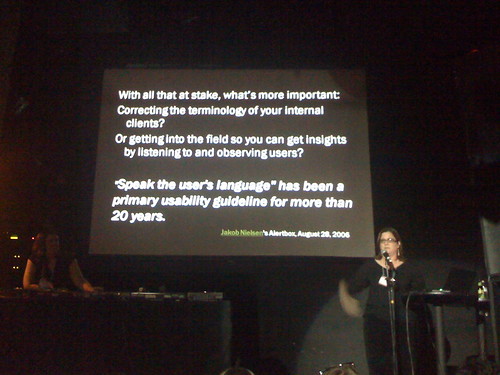URF08

Thanks to Steve Portigal for Aviva's Pic
On Friday, November 7, I travelled to San Francisco, CA to check out a 1/2 day conference put on by Nate Bolt and Bolt | Peters. This event, dubbed User Research Friday, brought together design research and user experience professionals for education and conversation. The big conferences can be great - CHI, IDSA, IXDA - but there was something great and very tangible about this short and fairly small gathering. 150 people gathered for 5 hours to learn and network - then it was gone. But it was good! The limited amount of speakers meant you only saw great speakers, not 5 so-so and 1 great one in a day. The topics were right on target for things that UX and design research professionals deal with every day.
A brief overview:
Steve Portigal of Portigal Design
Focused on the symbiotic relationship between research and design. We are indeed co-dependents. He shared a reminder that prototypes are just that, they are development tools and don't always have to be usable. He put into words something most of us do naturally, but reminded us that should not talk to people in our language, but in theirs - that is the language of the user, not the language of your client.
Indi Young now independent, but a founder of Adaptive Path
Indi's claim to fame is the development and refinement of mental models. Though her talk jumped in head first with nary an explanation of what exactly a mental model is and isn't, she brought up interesting ideas for segmentation and analysis. She suggests segmenting by behaviors, beliefs and actions rather than the traditional market research strategy of age and gender. A chat with Indi afterwards clarified mental models for me. If you want even more information and her new book, check this link: Mental Models
Aviva Rosenfeld of Ask.com
Nate Bolt, event host, asked Aviva to particularly address the ethnography debate between designers and anthropologists. She queried why it was difficult to see ourselves as ethnographers. After a life altering experience at EPIC a few years back, I've been afraid to use the word myself! The conclusion was that it's important to do good research. Whether or not it's "ethnography" is fairly irrelevant. My two cents: It is almost impossible to do "true ethnography" on the product development timeline.
Kris Mihalic of Yahoo! Mobile research
This was a very brief presentation - I can't say I have any relevant commentary.
Dan Saffer of Kicker Studio
A great way to end the afternoon! Dan took all of the practical advice of the day and spun it on it's head. He talked through every way possible of tweaking your research to make it show exactly what you want to show. Though we've all been tempted, I do hope it was all tongue in cheek!
Core 77 Post with video links to full presentations


Comments
http://www.kickerstudio.com
Cheers,
Dan